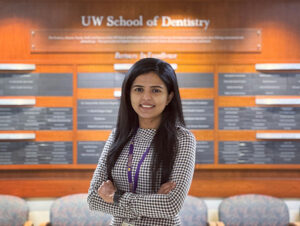
Priyanka Prajapati, a student in the UW School of Dentistry’s International Dentist DDS (UWIDDS) program, has done a tremendous job using interprofessional collaboration to help improve access to oral health care for underserved populations, winning a national award along the way.
This past year, she turned her research in the classroom into real-life change out in the field.
Her project, developed in a course at the School of Dentistry and conducted through the Timothy A. DeRouen Center for Global Oral Health, designed a research study and implemented the World Health Organization’s (WHO) training modules for oral health in primary healthcare settings to train non-dental healthcare workers in Kisumu, Kenya.
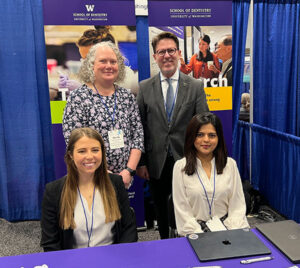
Her research confirmed that implementing the training modules improved the providers’ knowledge of oral health care (many of whom had received little to the oral health training before), and she found they were interested in continuing their education further.
Priyanka’s next project, which the DeRouen Center has just finished conducting, taught some of the same healthcare workers how to perform oral exams and how to identify oral diseases, including HIV related lesions within the oral cavity. The success of this project will be based on metrics such as increased levels of knowledge and confidence levels in conducting oral exams.
For most people, venturing all the way to Kenya to help establish basic oral health training for an entire country would be a daunting task.
For Priyanka, it’s just the latest step in her work to improve health outcomes around the world.
A Passion for Preventive Care
While completing her dental training in rural India, her home country, Priyanka Prajapati witnessed firsthand the consequences of a lack of access to dental care.
At the clinic where she was training, Priyanka encountered a staggering range of oral health diseases. Some patients arrived unable to open their mouths. Others bore the unmistakable signs of advanced oral cancer.
While each patient presented a new problem, Priyanka began to notice a pattern: Patients were only coming in when their problems were out of control.
For the population in the region, access to dental care was scarce, at best. Patients who visited her clinic often traveled for miles, using the little money they had to address urgent oral health issues – ones that typically started as a small discomfort, but escalated without early treatment.
“When I first began training to be a dentist, dental care, for me, was associated with patients getting out of pain,” said Priyanka. “Treatment was much more reactive, not preventive.”
“As I connected with these patients, I learned about their obstacles to accessing dental care, many of which were due to socio-economic barriers,” she said. Priyanka and her colleagues visited local villages, educating communities on proper oral care, performing check-ups, and informing them about dental clinics in the region.
“I was overjoyed when people began to show up at the clinic and were eager to learn about oral health and receive some much-needed care,” she said. “Observing the influence of these small actions was uplifting and inspired me to discover strategic ways to improve access to care.”
Priyanka spent months listening to patients’ stories. After moving back home to Mumbai, she began working in a government hospital. There, she noticed the same patterns in her patients.
After deciding that furthering her education was going to be the next step in her journey, Priyanka ventured out of India to Canada, where she completed McGill University’s Master of Dental Sciences program, specializing in clinical and population health. “I got to learn everything from epidemiology to implementing public health programs, to understanding what a community needs and how to tailor programs to meet them,” she said.
Once she earned her Master’s degree, Priyanka began working with the Canadian health authorities, where she learned how to use data to make decisions that increased efficiency in hospitals, emergency rooms and dental clinics to improve patient experiences.
After a few more years of work in Canada, Priyanka felt it was time to balance her passion for clinics and public health projects. That’s when she crossed paths with the Director of the DeRouen Center for Global Oral Health, Dr. Ana Lucia Seminario.
Changing the Community in Kisumu
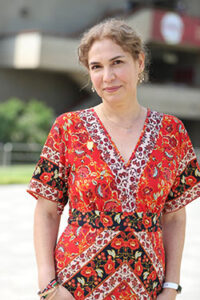
Priyanka Prajapati reached out to Dr. Seminario in the summer of 2022 after learning about her leadership and expertise at the DeRouen Center.
“Her commitment to improving oral health in underserved communities, both locally and internationally, resonated with my passion for clinical population health and equity, and I was eager to contribute,” said Priyanka.
In her initial work with Dr. Seminario, Priyanka supported research projects by analyzing data, conducting literature reviews, and assisting with manuscript preparation for projects in Washington, Kenya and Peru — three of the four regions the DeRouen Center works closely with.
“[Priyanka] showed strong professional presence with maturity, responsibility and a true passion for global oral health right away,” said Dr. Seminario. “She was excited to dive into research methods, international health policy and manuscript writing — and her background in large database management made her a perfect addition to our team.”
Being involved with Dr. Seminario and the DeRouen Center further inspired Priyanka to apply to the UWIDDS program in 2023.
After being accepted into the program, Priyanka joined the Class of 2026 — with whom she’ll graduate this spring. She and the rest of her cohort are in the process of completing 10 quarters of classes before receiving their DDS degrees from the UWSOD.
“When the time came and I got into school, I knew that I [wanted to] take more courses where I could learn more about global oral health,” said Priyanka.
One of her first choices for a selective course was DENTSL 652 — “Advanced Global Oral Health: From Theory to Action” — taught by none other than Dr. Seminario.
Already with prior experience working in Kenya, Priyanka was chosen as one of a handful of students in the course who could take their research project from the classroom into the field.
Using research conducted by previous students in DENTSL652, Priyanka further familiarized herself with the barriers to oral health training in Kenya. She found providers in the area were keen on receiving more oral health training than they were getting, which was little to none.
Since Dr. Seminario and the DeRouen Center were already well-connected with oral health professionals in the region, Priyanka had an excellent opportunity to implement her research.
“We tried to look for validated resources of information where we could train non-dental healthcare providers to identify oral diseases, to collect more information and make them more aware about oral health,” said Priyanka.
“The reason being, the number of dentists in Kenya, and specifically in Kisumu, is very low, which adds to the number of systemic barriers for patients who are already facing life challenges that make going to the dentist low on their priorities.”
So, with help from Dr. Immaculate Opondo, a pediatric dentist at Maseno University in Kenya and a close colleague of the DeRouen Center, Priyanka first tested the oral health knowledge of the providers for a control. Then, she powered up a projector and gave them a crash course in oral health care using a presentation from WHO on oral health training in a public health setting.
The lecture was followed by a Q&A session with Dr. Opondo. The patients were then tested again to see if their oral health knowledge had improved, which, overall, it did.
The first project was such a success that the Kenyan providers expressed substantial interest in doing hands-on training and learning more. So, Priyanka put together a second project.
The follow-up project, conducted this month by the DeRouen Center, taught providers how to identify oral diseases and manifestations that occur with HIV through practices like lifting the lips and raising the tongue. The pre-recorded training module for the second project was adopted from a Pediatric HIV/AIDS Cohort Study designed by Dr. Caroline H. Shiboski from the University of California, San Francisco. Hands-on training was administered by Dr. Opondo.
“The hope is that the more success we see or the more engagement we see, the more it can be implemented in similar settings where access to dental care is limited,” said Priyanka. “Just integrating oral health awareness and oral exams when patients go in for the regular primary checkup or their visits to the doctors.”
Interprofessional Collaboration in the Region
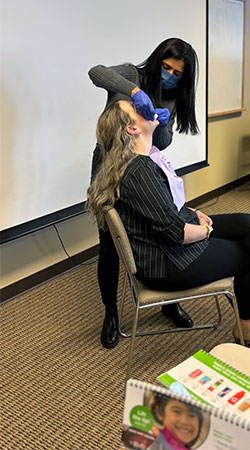
Priyanka wouldn’t be considered a global oral health activist if her work was limited to one country.
Through the course DENTEL651 — “Equity and Access to Oral Health Care,” — which is taught by Dr. Amy Kim, the Director of the UW Priyanka and a few of her classmates have been teaching groups of UW Medicine and UW and Montana State University nursing and allied health students to be more aware of oral health when treating patients, and encourage them to refer patients to dentists.
Some examples of their curriculum include fluoride application, examinations, connecting oral health to overall health, nutrition, checking a patient’s mouth for diseases, sharing examples of small caries turning to larger caries, and case studies.
The goal of Priyanka’s work is to build a foundation of basic oral health training amongst primary healthcare providers who are planning to serve in remote and rural areas in the WWAMI region (Washington, Wyoming, Alaska, Montana, Idaho). In these areas where access to dental providers may be limited, primary care providers can use this training to identify oral health diseases and refer their patients to dentists.
“Knowing people see primary care providers more frequently than a dentist, particularly in remote area s, a provider who can also check for oral health diseases , counsel on nutrition, or offer a fluoride varnish, can make a big difference,” said Priyanka. “That’s the direction we’re going.”
After presenting to students last October, Priyanka plans to return to the same areas and re -teach her oral health training courses next month.
Presenting Projects and Accumulating Awards
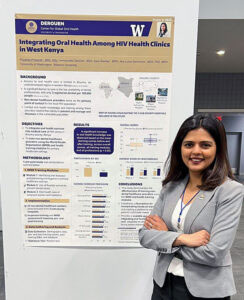
Priyanka has garnered plenty of attention for her work.
She was selected as the winner of the American Public Health Association’s prestigious Anthony Westwater Jong Population Oral Health Pre-Professional Award for her work in Washington and Montana.
Earlier this year, she traveled to New York to present her first project, titled “Integrating Oral Health Among HIV Health Clinics in West Kenya,” to the American Association for Dental, Oral and Craniofacial Research (AADOCR) for their annual meeting and exhibition.
Her upcoming project was developed through the School of Dentistry’s Summer Undergraduate Research Fellowship (SURF) program. She will present these findings at the 2026 School of Dentistry Research Day this winter.
But to Priyanka, the presentations and the awards are just motivators telling her to keep doing what she’s doing — helping those who lack easy access to oral healthcare.
“This award means I’m on the right path,” said Priyanka. “[It means] I’ve got to keep going, to continue collaborating and trying to implement and spread the projects even more.
“If I’m going to continue doing what I’m passionate about — and that is to make a difference in people’s lives in terms of their oral health and overall health, and mostly in communities where there’s limited access — when I get recognized like this, I feel like it means I was doing something good for someone.”
“Priyanka is a deeply compassionate person, both personally and professionally,” said Dr. Seminario. “She’s turning her passion into action by helping integrate oral health into the medical care that HIV patients receive in community clinics. Her warmth and genuine personality have helped her build strong trust within the communities she serves.”